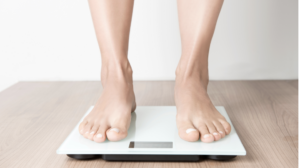What Weight Loss Really Looks Like on the Scale
Many factors can go into why the number on the scale changes daily. Here are just a few;
Midnight Snacking
Eating a big meal or snacks closer to the time you go to bed means that less food will be digested by the time you wake up. If the first thing you do every morning is weigh in, late-night meals may be the culprit to the number on the scale going up.
Water Retention
Eating lots of high-sodium foods and foods high in carbs will lead to retaining more water. Only two cups of water can translate into about one pound of body weight.
That Time of the Month
Over a month, a female’s weight can fluctuate significantly due to the rapid fluctuation in hormones. Some females may bloat more, retain more water and even emotionally eat during the menstrual cycle, inevitably affecting their weight. So, if you are trying to lose weight, try and control those menstrual cycle cravings and drink plenty of water. But remember – weight gain during your menstrual cycle is normal! Females regularly gain 3-6 pounds around that time of the month.
Exercise
This is a big one. Let’s go back to seeing your friend lose weight at a rapid pace compared to your more steady decrease or plateau. Exercise can lead to both the number going down and up on the scale depending on the person and the type of exercise.
Cardio exercises such as running, swimming, and biking are good for burning calories and are good for weight loss. If you do lots of cardio, chances are the number on the scale is going down. Weightlifting, on the other hand, will build muscle as well as burn calories. If you do a lot of weightlifting, you may find the number on the scale increase – meaning you’re building more muscle – or simply plateauing – meaning the weight you’re losing is being replaced by muscle gain.
Now think back to that friend you’re comparing yourself to – how different are your exercise regimens? How often are both of you training? Do they prefer cardio whereas you prefer weightlifting? Look at the big picture – both of you are on your own journey and doing great!
Alcohol
Similar to exercise, alcohol can make the number on the scale go up or down, funnily enough. Alcohol is a diuretic that can lead to much water loss overnight. However, alcohol can also make us eat very salty foods which could lead to weight gain. Not to mention the high-calorie count in some alcoholic beverages that many forget. Either way, drinking alcohol can affect the number on the scale.
High Food Mass
Lastly, food mass. If you enjoy eating high-volume foods such as white fish, vegetables, potatoes, and lean meats, you can eat a much higher volume of food while consuming fewer calories. Yay! If you are in a deficit, you will lose weight – however, sometimes in the short term, eating high-volume foods can lead to an increase in the number on the scale simply because you have more food bulk in your stomach. To put it simply, 200 calories in potatoes will weigh more than 200 calories in pizza.
As you’ve learned, what you see on the scale can make you interpret your weight loss journey as completely different that its reality. Seeing the same weight, and even an increase in the number on the scale can be a good thing. Remember – muscle weights more than body fat! You can always focus on losing weight, just as you can focus on maintaining your weight or even gaining weight. There is no right or wrong, you just need to be ready and committed to whatever goal you set for yourself.




